
Women between the ages of 20-35 may be asked to get an anti-mullerian hormone test and other hormonal tests, such as FSH and estradiol.
The egg count, also known as ovarian reserve, evaluates your fertility chances. The AMH test aims to calculate the remaining egg quantity. This test helps evaluate other reproductive conditions, including menopause prediction, menstrual cycle, etc.
However, your ovarian reserve decreases as you age. It means your fertility rate drops, reducing your chances of getting pregnant. This article explains some great methods on how to improve your AMH levels.
Table of Contents
What is an Anti-Mullerian Hormone?
The anti-mullerian hormone, also called the anti-stimulating hormone, is a glycoprotein hormone produced by the granulosa cells of developing follicles. This hormone is produced inside your ovaries and maintains the egg count.
The anti-mullerian hormone is an important building block for a successful pregnancy. In easier words, it is a biomarker for your ovarian reserve. Low levels of AMH can lead to various fertility issues. Hence, knowing your AMH levels through an anti-mullerian hormone test allows you to conceive at the right time.
The Anti-Mullerian Hormone and Pregnancy

Source: unsplash.com
Recent medical studies show that low anti-mullerian hormone levels can cause difficulty in getting pregnant within your childbearing years. Women aged 25 to 35 years with low levels of AMH may experience similar challenges compared to neat 40s.
Here is a list of normal levels of AMH for women;
- 25 years old – 3.0 ng/mL
- 30 years old – 2.5 ng/mL
- 35 years old – 1.5 ng/mL
If you are getting monthly periods but have low levels of AMH, it may be possible for you to conceive. However, keep in mind that pregnancy with low levels of AMH leads to certain complications, including;
- Miscarriage
- Premature delivery
- Ectopic pregnancy
- Mal-nutritioned newborn
- Early menopause
- Irregular periods
3 Ways to Increase Your AMH Levels

Source: unsplash.com
The tips described here are only effective if you stay consistent with them. You can increase the levels of your anti-mullerian hormone by following these tips;
- Get more vitamin D – a vitamin d deficiency is common among young girls. Vitamin D is responsible for regulating granulosa cells. As a result, the granulosa cells boost AMH production, leading to better ovarian reserve. Eat food rich in Vitamin D, such as fish, soybeans, vegetables, eggs, and dairy products.
- Daily physical exercise – exercise is another excellent way to maintain a healthy reproductive system. You have to be consistent with your physical exercise if you want to improve your AMH levels. Physical exercise will boost blood circulation and enhance the production of AMH levels in your blood.
- Acupuncture – this is something every person should do to maintain overall health. Irregular periods, hormonal imbalance, weight loss, or PCOS may be due to low AMH levels. Going for acupuncture can clarify your blood and improve the product of AMH.
Final Words
A low level of AMH can negatively impact your overall health. It can lead to multiple health and fertility issues. Practising these tips can help you maintain your overall fertility health.







